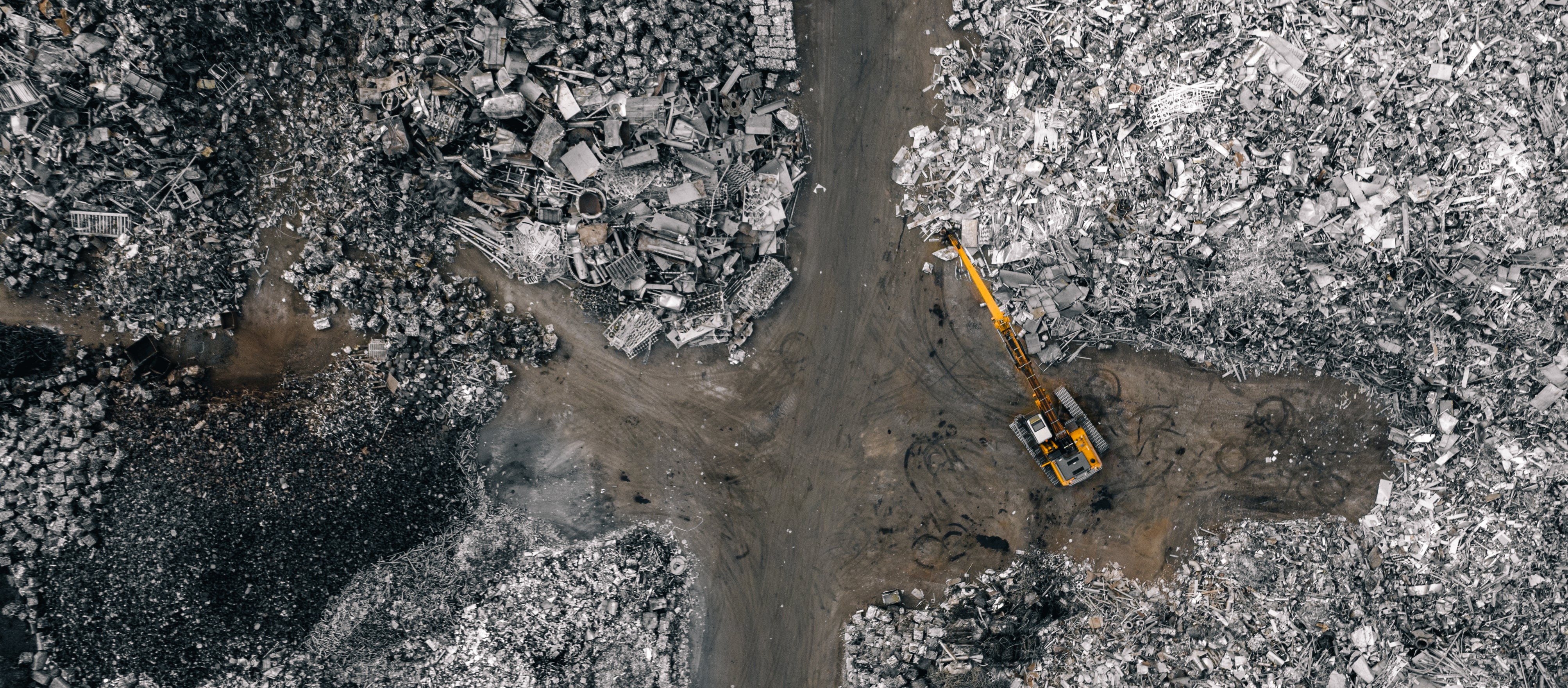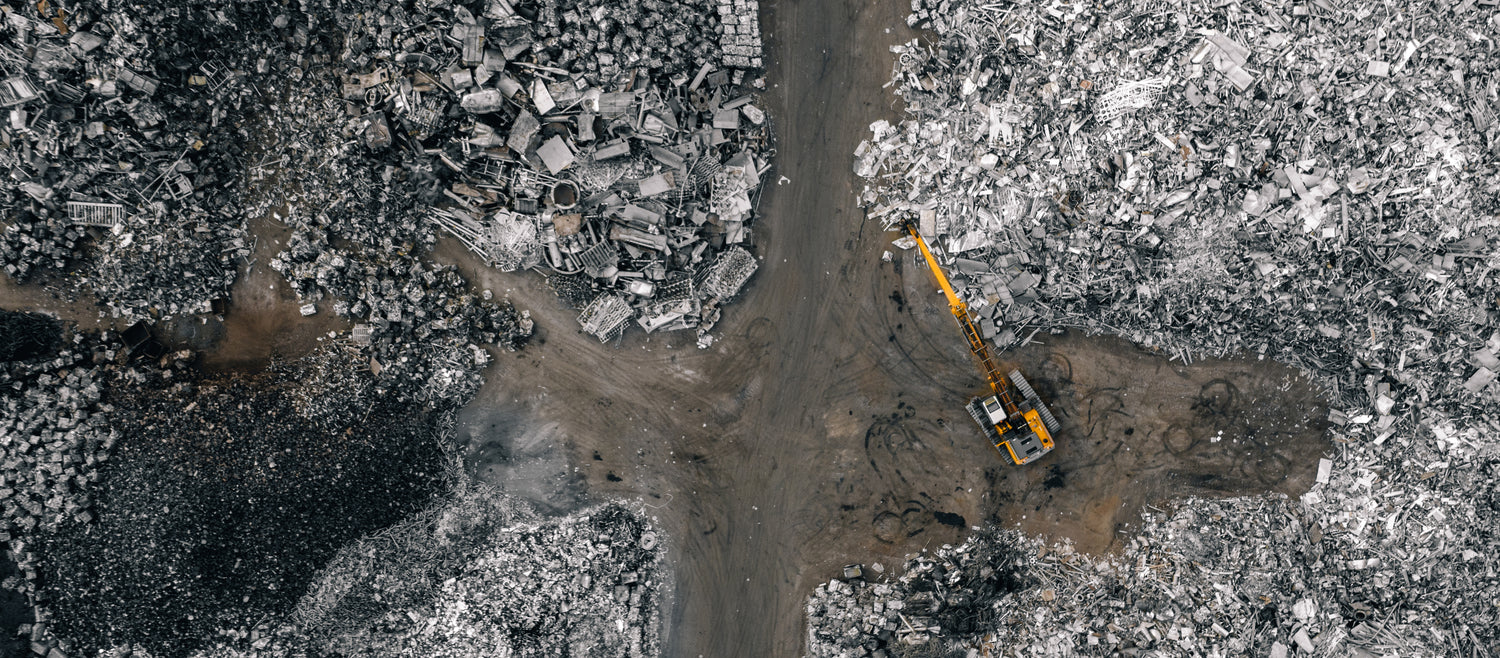At the heart of our digitally-driven world, the sprawling metropolis of modern business is battling a silent, albeit colossal, nemesis: electronic waste, or as it's typically known, e-waste.
As boardrooms across Britain buzz with strategies for the next digital frontier, the looming shadow of discarded electronics grows steadily.E-waste is the fastest growing waste problem globally, and this is a critical discussion that warrants light and attention. This article breaks down many e-waste solutions and other key points, such as:
- What is e-waste, and why does it matter?
- The environmental damage and impact of e-waste
- Legislation around e-waste
- Opportunities for businesses to turn e-waste into revenue
- Actionable steps for companies to fight e-waste
Regardless of size, from small and medium sized enterprises to multi-national corporates, every business must do their part to act responsibly, find e-waste solutions and look at the opportunities that the proper disposal of used electronic devices presents.
What is E-Waste and Why Should Businesses Care?
E-waste isn’t just yesterday's discarded gadgets gathering dust. It's a rapidly growing concern, encompassing everything from that vintage desktop computer in your office corner to the cutting-edge MacBook Pro you might acquire next year.
Every time we marvel at the latest digital innovation, we're also glimpsing a future piece of e-waste generated. In a society where 'newer' is often synonymous with 'better', electronic products can be left by the wayside long before they truly wear out. It's a challenge born from our insatiable appetite for the newest tech on the block.

Britain’s Digital Embrace and Blind Spot
The UK, swept up in the global digital whirlwind, has wholeheartedly embraced the benefits of modern technology. Our businesses, in pursuit of sharper efficiency and the edge over competitors, have become tech havens. But every shiny device comes with an expiry date, marking not just the end of its utility but the beginning of its potential environmental impact.
This has been a noted trend over the years, leading to the UK becoming the second worst producer of e-waste per capita globally in 2022, only behind Norway.
The business community in Britain is particularly culpable, and recent trends such as redundancies in the tech sector mean that as people leave that employer, there are large amounts of electronic devices that need to be properly recycled and not irresponsibly disposed.

Peering into the Heart of Electronic Devices
E-waste isn't just a composite of plastic and metal. Within these discarded devices lies a complicated array of precious materials:
- Hidden Treasures: Beneath their unassuming shells, many devices are gold mines – quite literally. They harbour metals like gold, platinum, and palladium. These valuable resources are often lost to improper disposal.
- A Toxic Liaison: Alongside these riches, electronic gadgets bear toxic materials. Though crucial for certain functionalities, chemicals like lead, mercury, and cadmium carry grave implications for the environment when not disposed of responsibly.

The E-Waste Conundrum: An Unfurling Environmental Epic
The ramifications of e-waste extend far beyond cluttered storerooms or overflowing landfills. The narrative is complex, from environmental degradation to squandered economic opportunities.
The devastating environmental impact
The haphazard disposal of electronic waste doesn't just blemish landscapes but brings about tangible environmental repercussions that resonate globally, with developing countries bearing a significant brunt:
Soil: Globally, the issue of toxic e-waste infiltration into soil isn't isolated to one region, it is developing countries which often become dumping grounds for discarded electronics. In these places, hazardous waste and toxic chemicals leach into the earth, disrupting fragile ecosystems and jeopardising agricultural outputs.
According to a report by the United Nations, an estimated 54 million tonnes of e-waste is generated yearly, of which a mere 17% is recycled, leaving a vast majority to adversely impact the soil.
Water: Our planet's rivers, from Britain's Thames to the Yangtze in China, are at risk. Pollutants from e-waste make their way into water systems, affecting aquatic life and jeopardising water quality. Furthermore, communities relying on these rivers for sustenance and livelihoods are at risk. The World Health Organisation reports that over 1 billion people globally lack access to clean water, a situation exacerbated by e-waste contamination.
Air: Incineration of e-waste is a practice not confined by borders. While it serves as a method to diminish the volume of waste, it releases toxic fumes into the atmosphere, reducing air quality and contributing to the overarching climate crisis. The emissions from burning plastics found in e-waste can release dioxins that impact human health and have irreversible health effects.
According to the World Health Organisation, they can cause reproductive and developmental problems, damage the immune system, and lead to cancer. The global interconnectedness of our air means that the pollutants released in one region can have ramifications far and wide.

Lost Economic Opportunities
The narrative of e-waste isn't solely woven with tales of environmental woes. A distinct subplot of substantial economic opportunities is lying in wait, often squandered.
Untapped Wealth:
Estimates suggest that tonnes of recoverable materials lie dormant in our discarded gadgets. With proper e-waste management strategies, British businesses could tap into a new revenue stream, recover valuable materials and reinvest this into sustainable, circular practices or technological upgrades.
The Cost of Indifference:
However, the current paradigm of indifference exacts a hefty price. With each improperly disposed electronic device, businesses don't merely forsake potential revenue; they inadvertently finance environmental degradation. The cost of rehabilitating polluted landscapes and water sources and the economic implications of health hazards limits the potential gains from electronics recycling.
Business-Centric Solutions: Leading the Fight Against E-Waste
The e-waste problem demands more than mere acknowledgement; it beseeches businesses to champion the cause, crafting innovative solutions tailored to their unique operational landscape.
Green Procurement Protocols
E-waste starts at the inception of a product's journey into your company. For businesses rooted in Britain's modern, environmentally-conscious marketplace, refining procurement strategies can make a profound difference:
Adopt a Green Criteria Checklist
Before purchasing any electronic equipment, ensure it adheres to a predetermined set of green standards. Does the product have a longer-than-average lifespan? Is it energy efficient? Are parts easily recyclable? Has it been purchased sustainably with a reduced carbon footprint?
There are multiple ways of purchasing sustainable hardware, including refurbished, excess stock or certified pre-owned.
Vet Your Suppliers
Seek suppliers who prioritise sustainability at the heart of their operations. A good measure of this is whether they are B-Corp accredited, which means they've passed certifications showing their commitment to sustainable practices.

Train Your Team
Equip your team with knowledge of e-waste implications and the benefits of green products. This ensures they're selecting suppliers or working with partners such as agencies based on cost, quality and sustainability metrics.
Repair, Not Replace
When a device has issues, your first thought should be to get it repaired with a specialist, not replaced. Just because batteries die doesn't mean devices do too.
Evaluate your Business Policy
Many businesses have policies that mandate new tech is purchased every 2-3 years. Not only is this unnecessary, but hugely detrimental to the global e-waste problem. Business leaders need to re-examine these policies and find a way to update it with principles from the circular economy.
IT Asset Recycling
When you are finished with a device, and repair is not an option, it's important to recycle your devices with a trusted partner. This is critical for several reasons:
- Ensuring all data is securely wiped.
- Turn these devices into revenue and get money back.
- Combat e-waste.

Employee Engagement and Training: The Stewards of Change
A strategy, no matter how robust, is rendered futile without its foot soldiers – the employees. In the e-waste crusade, they are the stewards of change.
Educative Workshops: The saying 'knowledge is power' holds profound resonance here. Workshops and education on e-waste's environmental and economic implications can spur employees into action, not just at work, but at home. Steps as simple as recycling old cell phones can go a long way.
Incentivising Responsible Behaviour: Beyond mere education, businesses can weave in tangible incentives. Recognising and rewarding teams or individuals for responsible e-waste disposal, innovative solutions, or even awareness campaigns can galvanise the entire organisation.
A Culture of Conscious Consumption: Lastly, it's about fostering a workplace culture rooted in conscious consumption. When employees routinely question the necessity of a new gadget, mull over the potential of repurposing, or advocate for recycling, it's indicative of a seismic cultural shift – one that bodes well for the e-waste narrative and shows that you're building an environmentally-responsible business.
Legislative Implications: The Rulebook for E-Waste Management
The mounting e-waste issue, coupled with its environmental and economic implications, has caught the attention of UK legislators. To counter this growing challenge, the UK has established specific legislative frameworks that guide and regulate businesses on e-waste management:
Waste Electrical and Electronic Equipment (WEEE) Regulations
What are WEEE Regulations? Instituted in 2007 and having undergone multiple amendments since, the WEEE Regulations are based on the principle of Extended Producer Responsibility (EPR). They necessitate producers of electronic and electrical equipment to finance and manage the collection, treatment, recovery, and eco-friendly disposal of e-waste.

Who's Affected?
Electronics Producers & Sellers: If you make, import, or retail electronics in the UK, this affects you.
SMEs with IT Departments: Your disposal methods for outdated electronics are governed by WEEE regulations.
Business Impacts
Costs & Savings: Potential savings may offset initial compliance costs, like metal recovery from old devices.
Design Choices: Opt for electronics designed for easy recycling and minimal environmental impact.
Reputation: Compliance boosts your green image, offering a competitive edge.
Collaboration: Consider joining forces with other SMEs to share solutions on e-waste.
WEEE Action Points for SMEs:
Stay Updated: Familiarise yourself with the nuances and latest amendments of the WEEE Regulations.
Choose Vendors Wisely: Find partners like Klyk who offer tech recycling schemes.
Train Your Team: Ensure everyone knows how to handle e-waste responsibly.
Connect with Local Councils: Learn about local recycling programmes or business incentives.
Reassess Disposal Strategies: Ensure your e-waste disposal aligns with WEEE directives.
Local Council Directives
The Grassroots Framework: Beyond the national and international mandates, e-waste management is also influenced by local council directives. These are often tailored to a region's unique challenges and opportunities, making them specific and crucial.
Implications for Businesses: Companies, especially those with multiple operational bases across Britain, must liaise closely with local councils. This ensures they adhere to these directives and benefiting from any localised support or incentives for e-waste management.
Conclusion - Finding E-Waste Solutions
E-waste is undeniably a monumental global challenge. However, businesses can convert this challenge into an opportunity. Not only will this pave the way for a greener Earth, but it will also usher in economic advantages, creating a win-win scenario for all.
If you want to start making a difference against the e-waste problem today and embrace the circular economy, book a meeting with the team at Klyk for a consultation call. Together we can harness e-waste solutions such as:
- buying sustainable hardware
- extending the life span of devices by repairing, not replacing
- turn used electronics into revenue by recycling them
Together we can build a brighter, more sustainable tech future.






